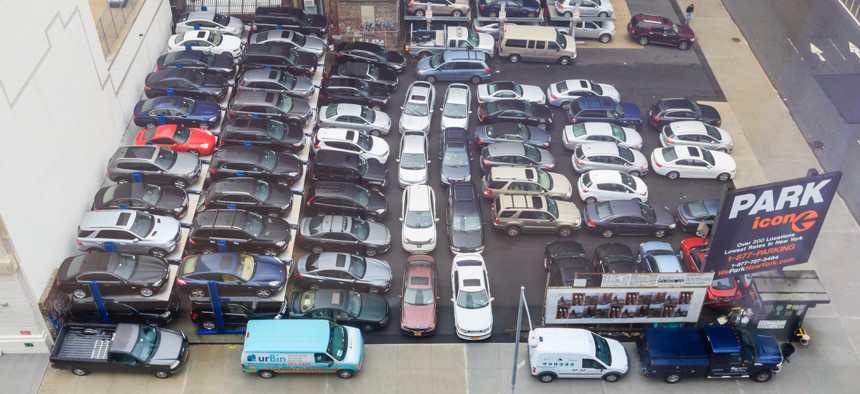1.6 Million Parking Spaces for 83,141 Households?

A crowded parking lot in New York CIty. Shutterstock
Study of five cities finds “lavish” amounts of parking.
New research that inventories the parking available in five U.S. cities suggests that it’s generally overbuilt, given current demand and expectations about future driving trends.
The Mortgage Bankers Association's Research Institute for Housing America study looks at New York City, Philadelphia, Seattle, Des Moines, Iowa, and Jackson, Wyoming and concludes these places have a “lavish amount of parking” that has required “monumental” investment.
"Today's empty parking spaces can be seen as a land bank in some of the most convenient city locations, or, taken another way, a future is arriving where builders will be able to provide more of everything else and fewer parking spaces," said the report’s author, Eric Scharnhorst.
New York was the only place among the five covered by the study with more homes than parking. In contrast, Des Moines has 83,141 households and 1.6 million parking spaces. In Jackson, a hub for tourists visiting nearby Grand Teton National Park, ski resorts, and other destinations, parking spaces outnumber homes 27 to 1, according to the report.
By calculating median land prices, and making certain assumptions, the study offers an estimate for the “replacement cost” of all parking in each city. In Seattle, for instance, it says there are 1.6 million parking spaces with an estimated value of about $35 billion.
The findings come as planners, policy makers and real estate developers mull questions about declines in car ownership, the rise of ride-booking and car-sharing, emerging self-driving vehicle technology, and how these trends could affect parking needs.
Gordon Clowers, a senior planner with the city of Seattle, has recently done extensive work on legislation to overhaul the local parking code.
"I agree that the pattern of development of parking in new developments generally has provided too much parking over many years, many decades,” he said by phone on Thursday.
“There's a lot of room to fine tune that,” he added.
As for the study, he described it as a decent yardstick to compare different places, and said it could have some relevance for assessing the real estate value of parking, but that it wouldn’t have been very helpful in the city’s recent parking code rewrite. “It’s a little bit high level,” he said.
In places with thriving real estate markets, discussions about parking are often intertwined with those about property development. “As land prices increase developers often replace surface parking with buildings full of other uses, and basements full of parking,” the report notes.
Parking spaces in structures come with a cost, which can be $60,000 or more, according to figures cited in the report. It adds: “After decades of requiring parking for new construction, car storage has become the primary land use in many city areas.”
Clowers said that with Seattle’s parking code revamp, part of what the city was trying to achieve is to allow for more housing to be developed on each piece of property, and to make it so the cost of building parking is less of a burden on the cost for new construction.
"If you require less, or very little, then you're enabling a much lower cost per-unit,” he added. “And you’re also actually preserving more space on the property to put more housing units in.”
Clowers pointed to 2012 research from the Bureau of Planning and Sustainability in Portland, Oregon, that shows how building more, or less, parking, or different types of parking, on a property has the potential to influence rent prices.
The deputy city manager in Des Moines, Matthew Anderson, said by email Thursday that he was aware of the study, but had not read it, and that he and the city manager were occupied dealing with recovery efforts after serious flooding there in recent weeks.
Mike Fratantoni, a trust administrator for the Research Institute for Housing America and the Mortgage Bankers Association’s chief economist, said in a statement that the new report "gives us a window into land-use trends that are sure to intensify in the coming decades."
A full copy of the report, which was released this week, can be found here.
Bill Lucia is a Senior Reporter for Government Executive's Route Fifty and is based in Washington, D.C.
NEXT STORY: Delivering citizen-centric state government






